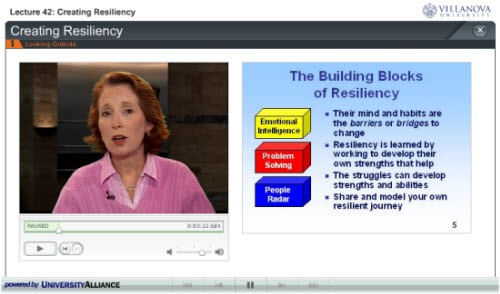Villanova Friday, Week 8: 3 Steps to Build Resiliency in Project Teams
 It’s the last week of the Maximising IT/IS Team Effectiveness course that I am taking with Villanova University. The focus this week has been on managing others and establishing an environment that moves others through change. One of the lectures was on creating resiliency in your project team.
It’s the last week of the Maximising IT/IS Team Effectiveness course that I am taking with Villanova University. The focus this week has been on managing others and establishing an environment that moves others through change. One of the lectures was on creating resiliency in your project team.
Why do we need resiliency?
IT projects are difficult. There is constant change on projects and it isn’t always the type of change you can see coming. IT project teams are under pressure to do more work of a higher quality with fewer people. There are time and budget constraints as well.
Resilient people can bounce back after setbacks or the announcement of change. Resilient teams react more quickly to surprise changes. They can help create a positive outcome and ensure things turn out OK in the end. Project team members who can do this are real assets.
“They need to be able to thrive in constant change, not just survive,” said Lou Russell, our online lecturer. “They need to be able to gain strength through being able to stand up to those changes.”
The 3 building blocks of resiliency
Lou explained that resilience is created through three things: emotional intelligence, problem solving and a ‘people radar’. These are all things that you can cultivate in yourself. You can also encourage them in your team members so that overall your team becomes more resilient.
Emotional intelligence
“It’s knowing what emotion you are experiencing right now, knowing why, and reacting appropriately in that situation,” said Lou.
She explained Daniel Goleman’s theory of emotional intelligence, which covers 5 elements:
- Self-awareness: help your team recognise their emotions and know their own strengths and weaknesses.
- Self-regulation: help your team practice self-control, especially when they get stressed, frustrated and angry; encourage them to be trustworthy and conscientious.
- Empathy: help your team to understand others’ perspectives; encourage diversity to create
agile teams. - Motivation: help your team understand what motivates them; explain what motivates the company overall (in terms of corporate objectives).
- Social skills: help your team influence others; manage conflict effectively; encourage collaboration.
Problem solving
Being able to solve problems quickly and effectively helps teams become adaptable and resilient.
“Take the time to do the analysis,” said Lou. “A lot of times, what makes your team less resilient is that they are not thinking.” Document what you have learned from the project and make sure this is actually learned, so it will help the team not make the same mistakes again.
“Accept that you are not perfect and share your mistakes with the team,” she said, “and that way everybody can learn together.”
People radar
‘People radar’ is the ability to read other people. You’ve probably been promoted to project manager because you have a better understanding of people than others. If you have the ability to understand others’ points of view and their motivational factors, you can coach your team in this skill, for example, by explaining organisational politics.
“Help them understand the importance of being able to understand where others are,” said Lou. She suggested that you get used to reading the emotions in the room during meetings. Encourage the team to discuss the emotions and agendas displayed during meetings after your guests have left and the environment is safe to talk about how the meeting went.
This dimension is also about being able to see change coming before it happens. Lou suggested testing your team with scenario planning and asking them what surprises they can see coming.
“If you are going to be a great IT/IS project manager the most important thing for you to do is to learn constantly,” Lou concluded. “Managing people is a journey, not a destination. There is always something new to learn. Continue to read and investigate what is important to your team.”
The Villanova course has been an interesting journey. Next week I’ll sum up my learning experience.

